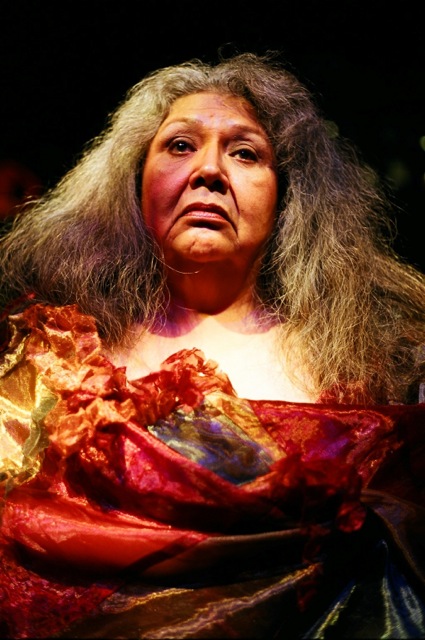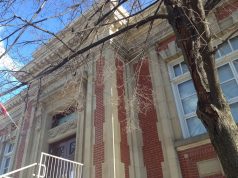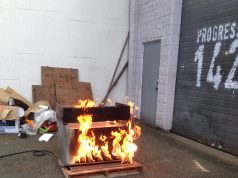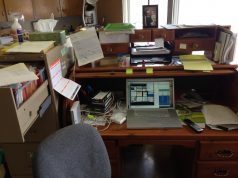
I was lucky enough to spend some time with Muriel Miguel this past week in Vancouver. Over the course of four days, I saw her perform excerpts from her one-woman show Red Mother as part of the Raven Spirit Dance gala, participated in a two-hour workshop with her on storyweaving at the Dance Centre, and heard her speak about her life’s work in a retrospective at SFU.
Muriel is one of my artistic elders. Her work with Spiderwoman Theater, North America’s oldest feminist Native theatre, has informed my work over the years. I have learned storyweaving from Muriel’s artistic descendents, Turtle Gals Performance Ensemble and students from Centre for Indigenous Theatre who benefit from Muriel’s teaching every year, but her workshop at the Dance Centre was the first time I have had the opportunity to learn directly from Muriel herself.
But as Muriel said in her retrospective, “I’m old”. Listening to her recounting of her journey is full of names like Joseph Chaikin, Uta Hagen, La MaMa. When Muriel talks about teaching, about modeling, she uses words like generous, and humility.
I have had great difficulty in my life, personal and professional, finding elders. For many reasons, we have had a hard time healing, and that retardation has kept us from “eldering up”. In my experience, very often those who identify most loudly and proudly as elders are the very ones I avoid. As Darrell Dennis’ hero Simon Douglas says in Tales of an Urban Indian, there’s a “difference between being an elder, and just being old.”
This lacuna prompted me to begin early in my life to strive to be the elder I would like to become. Therapists used to encourage us to nurture our inner child; me, I am working to cultivate my inner elder, and I have in the past few years been encouraging my colleagues and peers to do the same. Many of us almost young, but many of us are also only the second generation of what is a fairly young contemporary practice, and our elders are starting to pass on.
What is an elder but a keeper of knowledge for a community? What is an elder but someone who has experienced much, and over time examined her experience, tempering it with contemplation and reason, someone who has the patience to listen, the generosity to advise without rancour, to eschew judgment in favour of useful, astute observation, someone who can recognize the potential of another, and put her knowledge into the service of helping that other achieve.
We do all this work in theatre to make sense of the world, to ask the big questions: To be or not to be? Has god really abandoned the world, as the Angel in Perestroika suggests? What is the real cost of the Montreal Massacre? Should Tommy Taylor really Have Stayed Home? Is it possible after the environmental disasters, after the genocides, after our own rapacity, to make a new creation story, together, the way Toad and Lily do in A History of Breathing? [1]
We do all this work in the theatre to unearth the connections, illuminate them. We do this work to make sense of where we have been, and where we are going, not just for ourselves, but for all our communities. Does it not make sense then that all that making sense should extend outwards?
And yes, I know that some will make the argument of art for art’s sake, others the argument for art as entertainment, but as I age, I feel the pressure of time, and I have not got the time to just make art, or to merely entertain. I agree with the Coeur d’Alene writer Sherman Alexie who has said that Native folk do not have the luxury of just making art, because of our responsibility to the ancestors. Too many stories to tell that have been invisible or buried or twisted beyond recognition, too many lessons to be learned and passed on.
But I don’t think that this is only Indigenous artists’ bailiwick. I look around me and see many of my colleagues making work that asks the same questions I am asking, trying to make sense of the world in which we find ourselves together.
We must all of us “elder up”, recognize how we are connected to those who came before and those who are yet to come, and our responsibility to the knowledge we have been gifted.
[1] Hamlet, William Shakespeare; Angels in America, Part Two: Perestroika, Tony Kushner; The December Man, Colleen Murphy; You Should Have Stayed Home, Tommy Taylor; A History of Breathing, Daniel Macdonald.









